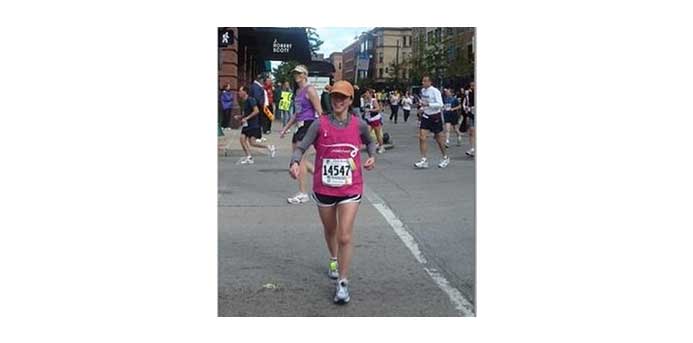Somewhere around mile 6, the first pain set in. The heel, the calf, a small twinge in the knee. Plus, it was cold. And I couldn’t help it, the thought did enter my mind: Why am I doing this?
Then I see him. David. The first thing I noticed was that he’s tethered to the person next to him. So, my eyes flew back to his shirt. It said: David. Blind Runner. The man next to him was wearing a shirt that said: Guide.
Marathons are tough. So tough that only 1 percent of the population will ever complete them. And here’s this guy who was probably told that he couldn’t do a marathon because he’s blind, and there he is doing it.
I congratulated him and started running a little taller.
Then around mile 8, I see a guy in full army fatigues. Combat boots and a pack included. He was struggling and sweating and needed some encouragement. So, I told him he was doing a good job and asked how heavy his pack was: 80 pounds, plus water.
Around mile 12, the energy started to flag again. Not quite the halfway point and the first finishers were already across the line. Then I saw a girl with a shirt that said: Remind me of why I’m running this marathon. So, I asked. Her response: Because I used to weigh 270, and I’ve lost 140 pounds. I told her she looked great (she did) and congratulated her.
At mile 14 I saw a familiar face in the crowd. I am a group leader for the Chicago Area Runners Association marathon training, and I saw Joe, one of my group members. He had been having some heel problems, but here he was running strong. I was so happy that someone I helped to train looked so great. We ran together for the next 6 miles, talking the entire way.
Starting at mile 20, the marathon was all mine. I knew I was going to make it. If I had to walk, limp or crawl, I knew I was going to hit the finish line. And this was where the euphoria set in.
I ran near U.S. Cellular Field and headed toward Chinatown. I watched the crowds and cheered with them. I did not hit “the wall,” and I reflected on the people who were running for a cause. All the shirts that passed throughout the marathon: American Cancer Society, Paws, Pink Streak, Children’s Memorial Hospital, World Vision, Team in Training, AIDS.
People are running for brother-in-laws with Alzheimer’s, family members who’ve had brain tumors, friends with breast cancer. They’re running to make a difference, they’re running because they can. Maybe they’re even running because someone told them they couldn’t.
At mile 25 when the finish line couldn’t get there soon enough, my dad met me and jumped in for about 30 seconds. That was all I needed to carry me through the end. That, and the reasons why I run.
I run for my friend Sharon who died with breast cancer in 2004. I run for my friend Tery who’s a 20-year breast cancer survivor. I run for my friend Mike’s sister Pam who died with breast cancer in February. I run because I can. I run to help others run. I run to make it better.
I have raised almost $1,500 to date for the Breast Cancer Network of Strength to ensure that no one faces breast cancer alone. To top it off, I’ll be donating my hair to Locks of Love in the next couple of weeks to contribute to a wig for a child who is suffering from medical-related hair loss.
The mission is to make it better, the instrument is 26.2 miles.
Reading recommendations:
Dr. Susan Love’s Breast Book:4th Edition 2005
The Victoria’s Secret Catalog Never Stops Coming: and Other Lessons I Learned from Breast Cancer
Marathon: The Ultimate Training Guide
Website recommendations:
Chicago Marathon Charity Program—If you want to run for a cause, check out all the charity partners for the Chicago Marathon
Breast Cancer Network of Strength—A national organization with a local Illinois chapter that works toward ensuring that no one faces breast cancer alone.
Jill Streaks Pink—Editor in Chief Jill Ciminillo’s fundraising page for Breast Cancer Network of Strength.
Locks of Love—a public non-profit organization that provides hairpieces to financially disadvantaged children in the United States and Canada under age 18 suffering from long-term medical hair loss from any diagnosis.

